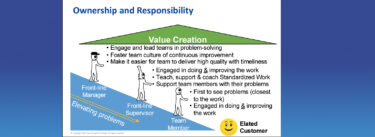Whew, what a year! Most everyone I know is eager to escort the hard times of 2009 out the door in hopes of a more prosperous 2010. While hope has never been a very effective business strategy, I remain optimistic for a good year ahead.
It’s been a month since I posted a new column. I did want to let the healthcare column sit there for awhile – not a month, but for a couple of weeks – to see how people would react. Hah – I’ll take no credit nor accept any blame for the passage of the two “healthcare reform” bills that occurred in the interim.
I haven’t been idle, though! We have big plans for this space going forward. As year’s end marks a good time for reflection, I plan to continue the Column and add new functionality, resources, and enlist the help of some friends. Let’s review where we’ve been.
Getting Started
I started this “eColumn” in October 2008 as a dialogue to explore lean management. I wrote in the first column:
“Lean management is not about quick answers, but about going through a thinking process to investigate, analyze, and understand. To try, perhaps to fail, and learn.”
In short, lean management is very much about asking questions and trying things, or encouraging others to try things. Lean management itself is not much about providing the right answer but it is very much about asking the right question.
So, what we’ll do in this space is just explore. What to expect — exploring questions. What not to expect — answers. Here’s a great quote that captures the spirit of what I’ll aim for:
“The scientific mind does not so much provide the right answers as ask the right questions.”
That quote (from the anthropologist Claude Levi-Strauss) remains the driving spirit of this column.
We decided originally not to call this a “blog” as the term seems to imply two things: frequent postings by the author and an expectation of an ongoing, lively, frequent give and take of questions, comments, and replies. I didn’t want to post more than once per week (a cadence that we kept pretty well, excepting this past month) and, more importantly, had no confidence that I would be able to respond promptly to comments and questions.
Eventually, though, I decided to encourage more interaction. I’ve enjoyed the give and take, and hope you have, too. I want to continue and intensify that aspect of this space in 2010.
From the beginning, this has been a management column, concerned not just with the book Managing to Learn, or with Toyota the company. The first column in fact discussed neither. But, most of the columns have been comprised of either elements of MTL or aspects of management as I learned it at Toyota.
Managing To Learn
MTL has been quite successful as a product. It is in its third printing, received the Shingo Prize for Research, and was reviewed to gratifying praise in corners from the Financial Times, IndustryWeek, to numerous blogs and newsletters including Business Process Trends, Learning about Lean, Training within Industry, Lean Printing, and The Lean Thinker.
The most gratifying words of all came from Toyota Chairman Mr. Fujio Cho, who, praised MTL for “redefining the meaning of ‘learning’ in organizations.” I was delighted, first of all that he even took the time to read it, but also that he chose to focus on the meaning of learning in organizations since that redefinition was an explicit goal for the book from the beginning – translating “organizational learning” into “operational learning” can help organizations and individuals transform high-level ideals into practical gemba-level action
Following publication of the book, last year my long-time colleague from Toyota days, David Verble, partnered with me to create a new two-day Managing To Learn workshop as a means of meeting the demand for the material discussed in the book. Over the course of the year two highly experienced Toyota veterans, Marek Piatkowski and Tracey Richardson, joined us to make the workshop available as a standard LEI monthly public offering and – upon request – on-site at your company. So far, we have offered the course about 15 times and I must say, we have been VERY pleased with the enthusiasm and learning demonstrated by the participants. And, of course, we instructors are learning JUST as much as the students! [Editor’s note: This workshop is also availble in an online version.]
But, it’s not all good news. Another long-time Toyota veteran colleague – Australian Tony McNaughton – complains that he finds “A3 Madness” has taken over some companies. Ouch. As feared, there have indeed been too many cases of companies that lock onto the A3 as yet another TOM – Tool Of the Month – hammers looking for nails; A3 templates looking for data and solutions. The last thing I wanted from MTL was to find A3s turned into corporate wallpaper alongside outdated SPC charts and unused value-stream maps. I think most companies have so far avoided this malady. Has yours?
Management
The topic of “management, whatever that is” seemed to come to the fore more than ever in 2009. Walking through the business aisle of even “Books a Million” reveals title after title of books on management and leadership. I can’t help but think that most of them are no help.
But, some interesting books have appeared in the Lean Community. I featured LEI’s Follow the Learner by Sami Bahri in this space and LEI also published Michael Ballé’s The Lean Manager, which has received broad acclaim as a practical and easy read. My Learning To See co-author Mike Rother, finished his Toyota Kata, completing several years of hard work, which can represent a new door for people to grasp essential dynamics of the lean approach to working and improving. Closer to the end of the year Doc Hall gave us Compression, his rallying call to senior leadership to lead firms to places far beyond the limited scope of today’s even most progressive enterprises. I hope Doc takes his “Doc’s Cubby Hole” – the informal discussion forum that Doc debuted at AME’s annual conference – on the road. Although released in ’08, Jeff Liker and Mike Hoseus’ comprehensive look at Toyota Culture made quite a well-deserved splash this year.
And more great book news, H. Thomas Johnson’s Profit Beyond Measure is available in paperback. It’s hard to believe that ten years have passed since first publication of Prof. Johnson’s groundbreaking work. The community is finally catching up to his thinking on lean and system sustainability.
Toyota
The lean community’s traditional exemplar Toyota stumbled mightily in 2009. In case you missed it, I wrote about “the Crisis and Toyota” shortly before their bad financial numbers began hitting the news over and over.
While the company will probably recover in terms of leadership in industry performance, much damage has been done to its sterling reputation. For a look at how long-lasting poor reputation can be and how difficult to shake, especially in a slow clockspeed industry like autos, read the article by my colleagues Bob Cole and Mike Flynn in the current issue of the California Management Review: Automotive Quality Reputation: Hard to Achieve, Hard to Lose, Still Harder to Win Back, (subscription or purchase required) Cole, Robert E., and Michael S. Flynn. (Bob Cole, by the way, is a long-time sensei of mine, the first American academic to really dive deep inside the auto industry in Japan, working on the plant floor of a supplier back in the 1960s. Long before I even met him, his articles and books were a huge inspiration to me to follow in his footsteps back in the mid 1970s.)
If their analysis is correct, and if Toyota’s woes continue much longer, the company may find that the halo effect it has enjoyed (and earned) with the buying public will erode. Check out the following observation from the CEO of China’s Geely Automobile, Shufu Li: “Why should I want to be like Toyota? They’re losing billions.”
Very interesting quote, from a number of standpoints. Betrays an arrogance, for one thing. But, does that make him wrong? What’s most interesting about it to me, is that just as Toyota began by copying Ford and GM, Geely began by copying Toyota. And now he’s saying that Toyota doesn’t even matter.
And so …
John’s Lean Management Column began as an experiment. As year’s end marks a good time for reflection such as this, I plan to continue the Column and add new functionality, resources, and enlist the help of some friends. In the works: a “User’s Guide” to assist in creating A3s, a website re-design including the debut of the “A3 Dojo”, the (maybe) “The continuing Adventures of Porter & Sanderson.” And, of course, questions. Lots of questions.
To quote again from the first column:
Lean management is very much about asking questions and trying things, or encouraging others to try things. Lean management itself is not much about providing the right answer but it is very much about asking the right question.
So asking and exploring questions is what we’ll continue to do.
john
John Shook
Senior Advisor
Lean Enterprise Institute






